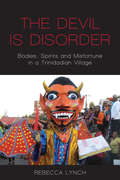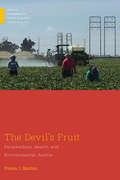- Table View
- List View
The Devil is Disorder: Bodies, Spirits and Misfortune in a Trinidadian Village
by Rebecca LynchWhat role might the Devil have in health and illness? The Devil is Disorder explores constructions of the body, health, illness and wider misfortune in a Trinidadian village where evangelical Christianity is growing in popularity. Based on long-term ethnography and locating the village in historical and global context, the book takes a nuanced cosmological approach to situate evangelical Christian understandings as shaping and being shaped by their context and, in the process, shaping individuals themselves. As people move from local to global subjects, health here stretches beyond being a matter of individual bodies and is connected to worldwide flows and networks, spirit entities, and expansive moral orders.
The Devil of Great Island: Witchcraft and Conflict in Early New England
by Emerson W. BakerIn 1682, ten years before the infamous Salem witch trials, the town of Great Island, New Hampshire, was plagued by mysterious events: strange, demonic noises; unexplainable movement of objects; and hundreds of stones that rained upon a local tavern and appeared at random inside its walls. Town residents blamed what they called "Lithobolia" or "the stone-throwing devil." In this lively account, Emerson Baker shows how witchcraft hysteria overtook one town and spawned copycat incidents elsewhere in New England, prefiguring the horrors of Salem. In the process, he illuminates a cross-section of colonial society and overturns many popular assumptions about witchcraft in the seventeenth century.
The Devil's Book of Culture: History, Mushrooms, and Caves in Southern Mexico
by Benjamin FeinbergSince the 1950s, the Sierra Mazateca of Oaxaca, Mexico, has drawn a strange assortment of visitors and pilgrims—schoolteachers and government workers, North American and European spelunkers exploring the region's vast cave system, and counterculturalists from hippies (John Lennon and other celebrities supposedly among them) to New Age seekers, all chasing a firsthand experience of transcendence and otherness through the ingestion of psychedelic mushrooms "in context" with a Mazatec shaman. Over time, this steady incursion of the outside world has significantly influenced the Mazatec sense of identity, giving rise to an ongoing discourse about what it means to be "us" and "them." In this highly original ethnography, Benjamin Feinberg investigates how different understandings of Mazatec identity and culture emerge through talk that circulates within and among various groups, including Mazatec-speaking businessmen, curers, peasants, intellectuals, anthropologists, bureaucrats, cavers, and mushroom-seeking tourists. Specifically, he traces how these groups express their sense of culture and identity through narratives about three nearby yet strange discursive "worlds"—the "magic world" of psychedelic mushrooms and shamanic practices, the underground world of caves and its associated folklore of supernatural beings and magical wealth, and the world of the past or the past/present relationship. Feinberg's research refutes the notion of a static Mazatec identity now changed by contact with the outside world, showing instead that identity forms at the intersection of multiple transnational discourses.
The Devil's Dinner: A Gastronomic and Cultural History of Chili Peppers
by Stuart WaltonStuart Walton's The Devil's Dinner looks at the history of hot peppers, their culinary uses through the ages, and the significance of spicy food in an increasingly homogenous world.The Devil's Dinner is the first authoritative history of chili peppers. There are countless books on cooking with chilies, but no book goes into depth about the biological, gastronomical, and cultural impact this forbidden fruit has had upon people all over the world. The story has been too hot to handle.A billion dollar industry, hot peppers are especially popular in the United States, where a superhot movement is on the rise. Hot peppers started out in Mexico and South America, came to Europe with returning Spanish travelers, lit up Iberian cuisine with piri-piri and pimientos, continued along eastern trade routes, boosted mustard and pepper in cuisines of the Indian subcontinent, then took overland routes to central Europe in the paprika of Hungarian and Austrian dumplings, devilled this and devilled that… they've been everywhere!The Devil's Dinner tells the history of hot peppers and captures the rise of the superhot movement.
The Devil's Fruit: Farmworkers, Health, and Environmental Justice (Medical Anthropology)
by Dvera I. SaxtonThe Devil's Fruit describes the facets of the strawberry industry as a harm industry, and explores author Dvera Saxton’s activist ethnographic work with farmworkers in response to health and environmental injustices. She argues that dealing with devilish—as in deadly, depressing, disabling, and toxic—problems requires intersecting ecosocial, emotional, ethnographic, and activist labors. Through her work as an activist medical anthropologist, she found the caring labors of engaged ethnography take on many forms that go in many different directions. Through chapters that examine farmworkers’ embodiment of toxic pesticides and social and workplace relationships, Saxton critically and reflexively describes and analyzes the ways that engaged and activist ethnographic methods, frameworks, and ethics aligned and conflicted, and in various ways helped support still ongoing struggles for farmworker health and environmental justice in California. These are problems shared by other agricultural communities in the U.S. and throughout the world.
The Devil's Half Acre: The Untold Story of How One Woman Liberated the South's Most Notorious Slave Jail
by Kristen GreenThe inspiring true story of an enslaved woman who liberated an infamous slave jail and transformed it into one of the nation&’s first HBCUs In The Devil&’s Half Acre, New York Times bestselling author Kristen Green draws on years of research to tell the extraordinary and little-known story of young Mary Lumpkin, an enslaved woman who blazed a path of liberation for thousands. She was forced to have the children of a brutal slave trader and live on the premises of his slave jail, known as the &“Devil&’s Half Acre.&” When she inherited the jail after the death of her slaveholder, she transformed it into &“God&’s Half Acre,&” a school where Black men could fulfill their dreams. It still exists today as Virginia Union University, one of America&’s first Historically Black Colleges and Universities. A sweeping narrative of a life in the margins of the American slave trade, The Devil&’s Half Acre brings Mary Lumpkin into the light. This is the story of the resilience of a woman on the path to freedom, her historic contributions, and her enduring legacy.
The Devil's Harvest: A Ruthless Killer, a Terrorized Community, and the Search for Justice in California's Central Valley
by Jessica Garrison"Meticulously researched and tightly woven, The Devil's Harvest is an important story because it tells us that if [this] can happen in one place, then it can happen in any place. And that's damn scary."--Michael Connelly, New York Times bestselling author of The Closers, The Lincoln Lawyer, and The Night FireA page-turning, suspenseful story of a drug cartel hit man who got away with murder after murder in California's Central Valley for three decades, The Devil's Harvest reveals how the criminal justice system fails our most vulnerable immigrant communitiesOn the surface, fifty-eight-year-old Jose Martinez didn't seem evil or even that remarkable--just a regular neighbor, good with cars and devoted to his family. But in between taking his children to Disneyland and visiting his mom, Martinez was also one of the most skilled professional killers police had ever seen.He tracked one victim to one of the wealthiest corners of America, a horse ranch in Santa Barbara, and shot him dead in the morning sunlight, setting off a decades-long manhunt. He shot another man, a farmworker, right in front of his young wife as they drove to work in the fields. The widow would wait decades for justice. Those were murders for hire. Others he killed for vengeance.How did Martinez manage to evade law enforcement for so long with little more than a slap on the wrist? Because he understood a dark truth about the criminal justice system: if you kill the "right people"--people who are poor, who aren't white, and who don't have anyone to speak up for them--you can get away with it.Melding the pacing and suspense of a true crime thriller with the rigor of top-notch investigative journalism, The Devil's Harvest follows award-winning reporter Jessica Garrison's relentless search for the truth as she traces the life of this assassin, the cops who were always a few steps behind him, and the families of his many victims. Drawing upon decades of case files, interrogation transcripts, on-the-ground reporting, and Martinez's chilling handwritten journals, The Devil's Harvest uses a gripping and often shocking narrative to dig into one of the most important moral questions haunting our politically divided nation today: Why do some deaths--and some lives--matter more than others?span
The Devil's Horn: The Story of the Saxophone, from Noisy Novelty to King of Cool
by Michael SegellIn The Devil's Horn, Michael Segell traces the 160-year history of the saxophone-a horn that created a sound never before heard in nature, and that from the moment it debuted has aroused both positive and negative passions among all who hear it. The saxophone has insinuated itself into virtually every musical idiom that has come along since its birth as well as into music with traditions thousands of years old. But it has also been controversial, viewed as a symbol of decadence, immorality and lasciviousness: it was banned in Japan, saxophonists have been sent to Siberian lockdown by Communist officials, and a pope even indicted it.Segell outlines the saxophone's fascinating history while he highlights many of its legendary players, including Benny Carter, Illinois Jacquet, Sonny Rollins, Lee Konitz, Phil Woods, Branford Marsalis, and Michael Brecker. The Devil's Horn explores the saxophone's intersections with social movement and change, the innovative acoustical science behind the instrument, its struggles in the world of "legit" music, and the mystical properties that seduce all who fall under its influence. Colorful, evocative, and richly informed, The Devil's Horn is an ingenious portrait of one of the most popular instruments in the world.
The Devil's Notebook
by Anton Szandor LaveyWisdom, humor, and dark observations by the founder of the Church of Satan. LaVey ponders such topics as nonconformity, occult faddism, erotic politics, the "Goodguy badge," demoralization and the construction of artificial human companions.
The Devil's Playbook: Big Tobacco, Juul, and the Addiction of a New Generation
by Lauren EtterBig Tobacco meets Silicon Valley in this corporate exposé of what happened when two of the most notorious industries collided—and the vaping epidemic was born.&“The best business book I&’ve read since Bad Blood.&”—Jonathan Eig, New York Times bestselling author of Ali: A Life Howard Willard lusted after Juul. As the CEO of tobacco giant Philip Morris&’s parent company and a veteran of the industry&’s long fight to avoid being regulated out of existence, he grew obsessed with a prize he believed could save his company—the e-cigarette, a product with all the addictive upside of the original without the same apparent health risks and bad press. Meanwhile, in Silicon Valley, Adam Bowen and James Monsees began working on a device that was meant to save lives and destroy Big Tobacco, but they ended up baking the industry&’s DNA into their invention&’s science and marketing. Ultimately, Juul&’s e-cigarette was so effective and so market-dominating that it put the company on a collision course with Philip Morris and sparked one of the most explosive public health crises in recent memory. In a deeply reported account, award-winning journalist Lauren Etter tells a riveting story of greed and deception in one of the biggest botched deals in business history. Etter shows how Philip Morris&’s struggle to innovate left Willard desperate to acquire Juul, even as his own team sounded alarms about the startup&’s reliance on underage customers. And she shows how Juul&’s executives negotiated a lavish deal that let them pocket the lion&’s share of Philip Morris&’s $12.8 billion investment while government regulators and furious parents mounted a campaign to hold the company&’s feet to the fire.The Devil&’s Playbook is the inside story of how Juul&’s embodiment of Silicon Valley&’s &“move fast and break things&” ethos wrought havoc on American health, and how a beleaguered tobacco company was seduced by the promise of a new generation of addicted customers. With both companies&’ eyes on the financial prize, neither anticipated the sudden outbreak of vaping-linked deaths that would terrorize a nation, crater Juul&’s value, end Willard&’s career, and show the costs in human life of the rush to riches—while Juul&’s founders, board members, and employees walked away with a windfall.
The Devil's Playground: A Century of Pleasure and Profit in Times Square
by James TraubAs Times Square turns 100, New York Times Magazine contributing writer James Traub tells the story of how this mercurial district became one of the most famous and exciting places in the world. The Devil's Playground is classic and colorful American history, from the first years of the twentieth century through the Runyonesque heyday of nightclubs and theaters in the 1920s and '30s, to the district's decline in the 1960s and its glittering corporate revival in the 1990s. First, Traub gives us the great impresarios, wits, tunesmiths, newspaper columnists, and nocturnal creatures who shaped Times Square over the century since the place first got its name: Oscar Hammerstein, Florenz Ziegfeld, George S. Kaufman, Damon Runyon, Walter Winchell, and "the Queen of the Nightclubs," Texas Guinan; bards like A. J. Liebling, Joe Mitchell, and the Beats, who celebrated the drug dealers and pimps of 42nd Street. He describes Times Square's notorious collapse into pathology and the fierce debates over how best to restore it to life. Traub then goes on to scrutinize today's Times Square as no author has yet done. He writes about the new 42nd Street, the giant Toys "R" Us store with its flashing Ferris wheel, the new world of corporate theater, and the sex shops trying to leave their history behind. More than sixty years ago, Liebling called Times Square "the heart of the world"--not just the center of the world, though this crossroads in Midtown Manhattan was indeed that, but its heart. From the dawn of the twentieth century through the 1950s, Times Square was the whirling dynamo of American popular culture and, increasingly, an urban sanctuary for the eccentric and the untamed. The name itself became emblematic of the tremendous life force of cities everywhere. Today, Times Square is once again an awe-inspiring place, but the dark and strange corners have been filled with blazing light. The most famous street character on Broadway, "the Naked Cowboy," has his own website, and Toys "R" Us calls its flagship store in Times Square "the toy center of the universe." For the giant entertainment corporations that have moved to this safe, clean, and self-consciously gaudy spot, Times Square is still very much the center of the world. But is it still the heart?
The Devil's Pleasure Palace
by Michael WalshIn the aftermath of World War II, America stood alone as the world's premier military power. Yet its martial confidence contrasted vividly with its sense of cultural inferiority. Still looking to a defeated and dispirited Europe for intellectual and artistic guidance, burgeoning trans-national elite in New York and Washington embraced not only the war's refugees, but many of their ideas as well, and nothing has proven more pernicious than those of the Frankfurt School and its reactionary philosophy of "critical theory." At once overly intellectualized and emotionally juvenile, Critical Theory - like Pandora's Box - released a horde of demons into the American psyche. When everything could be questioned, nothing could be real, and the muscular, confident empiricism that had just won the war gave way, in less than a generation, to a central-European nihilism celebrated on college campuses across the United States. Seizing the high ground of academe and the arts, the New Nihilists set about dissolving the bedrock of the country, from patriotism to marriage to the family to military service; they have sown (as Cardinal Bergoglio - now Pope Francis - once wrote of the Devil) "destruction, division, hatred, and calumny" - and all disguised as the search for truth.In The Devil's Pleasure Palace we will look at the ways Critical Theory took root in America and, once established and gestated, has affected nearly every aspect of American life and society - and what can be done to stop it.
The Devil's Riches: A Modern History of Greed
by Jared PoleyA seeming constant in the history of capitalism, greed has nonetheless undergone considerable transformations over the last five hundred years. This multilayered account offers a fresh take on an old topic, arguing that greed was experienced as a moral phenomenon and deployed to make sense of an unjust world. Focusing specifically on the interrelated themes of religion, economics, and health-each of which sought to study and channel the power of financial desire-Jared Poley shows how evolving ideas about greed became formative elements of the modern experience.
The Devil's Snake Curve: A Fan's Notes from Left Field
by Josh OstergaardThe Devil's Snake Curve offers an alternative American history, in which colonialism, jingoism, capitalism, and faith are represented by baseball. Personal and political, it twines Japanese internment camps with the Yankees; Walmart with the Kansas City Royals; and facial hair patterns with militarism, Guantanamo, and the modern security state. An essay, a miscellany, and a passionate unsettling of Josh Ostergaard's relationship with our national pastime, it allows for both the clover of a childhood outfield and the persistence of the game's service to those in power. America and baseball are both hard to love or leave in this, by turns coruscating and heartfelt, debut.Josh Ostergaard holds an MFA in creative writing from the University of Minnesota and an MA in cultural anthropology. He has been an urban anthropologist at the Field Museum and now works at Graywolf Press.
The Devil's Tramping Ground and Other North Carolina Mystery Stories
by Sue HardenFrom the first colonization at Roanoke Island, the bizarre and inexplicable have shrouded the Tar Heel State. From history and legend, John Harden records ominous events that have shaped or colored state history.
The Devil's Wall
by Mark CornwallLegend has it that twenty miles of volcanic rock rising through the landscape of northern Bohemia was the work of the devil, who separated the warring Czechs and Germans by building a wall. The nineteenth-century invention of the Devil’s Wall was evidence of rising ethnic tensions. In interwar Czechoslovakia, Sudeten German nationalists conceived a radical mission to try to restore German influence across the region. Mark Cornwall tells the story of Heinz Rutha, an internationally recognized figure in his day, who was the pioneer of a youth movement that emphasized male bonding in its quest to reassert German dominance over Czech space. Through a narrative that unravels the threads of Rutha’s own repressed sexuality, Cornwall shows how Czech authorities misinterpreted Rutha’s mission as sexual deviance and in 1937 charged him with corrupting adolescents. The resulting scandal led to Rutha’s imprisonment, suicide, and excommunication from the nationalist cause he had devoted his life to furthering. Cornwall is the first historian to tackle the long-taboo subject of how youth, homosexuality, and nationalism intersected in a fascist environment. The Devil’s Wall also challenges the notion that all Sudeten German nationalists were Nazis, and supplies a fresh explanation for Britain’s appeasement of Hitler, showing why the British might justifiably have supported the 1930s Sudeten German cause. In this readable biography of an ardent German Bohemian who participated as perpetrator, witness, and victim, Cornwall radically reassesses the Czech-German struggle of early twentieth-century Europe.
The Devil's Wheels: Men and Motorcycling in the Weimar Republic (Explorations in Mobility #2)
by Sasha DiskoDuring the high days of modernization fever, among the many disorienting changes Germans experienced in the Weimar Republic was an unprecedented mingling of consumption and identity: increasingly, what one bought signaled who one was. Exemplary of this volatile dynamic was the era's burgeoning motorcycle culture. With automobiles largely a luxury of the upper classes, motorcycles complexly symbolized masculinity and freedom, embodying a widespread desire to embrace progress as well as profound anxieties over the course of social transformation. Through its richly textured account of the motorcycle as both icon and commodity, The Devil's Wheels teases out the intricacies of gender and class in the Weimar years.
The Devil: Britain's Most Feared Underworld Taxman
by Graham JohnsonDrug dealers beware. The Devil is coming to get you. Gangster Stephen French invented the perfect crime: robbing drug barons of their huge fortunes. In SAS-style swoops, French raided their fortified mansions and tortured them with horrifying violence until they paid up. Through 'taxing' the richest and most powerful crimelords in the UK, he netted over £20 million.French was no ordinary criminal. He was a world-champion fighter, he studied psychology at university to master mind-control techniques, and he used the teachings of Machiavelli and samurai warriors to outwit his enemies. The Devil also reveals French's complex relationship with Curtis Warren, the wealthiest criminal in British history. The two were childhood pals, then partners and finally bitter enemies.Now a legitimate businessman, French built up a multimillion-pound empire. Having eventually turned his back on his former life, he is now seeking to set the record straight.
The Devil’s Music: How Christians Inspired, Condemned, and Embraced Rock ’n’ Roll
by Randall J. StephensWhen rock ’n’ roll emerged in the 1950s, ministers denounced it from their pulpits and Sunday school teachers warned of the music’s demonic origins. The big beat, said Billy Graham, was “ever working in the world for evil.” Yet by the early 2000s Christian rock had become a billion-dollar industry. The Devil’s Music tells the story of this transformation. Rock’s origins lie in part with the energetic Southern Pentecostal churches where Elvis, Little Richard, James Brown, and other pioneers of the genre worshipped as children. Randall J. Stephens shows that the music, styles, and ideas of tongue-speaking churches powerfully influenced these early performers. As rock ’n’ roll’s popularity grew, white preachers tried to distance their flock from this “blasphemous jungle music,” with little success. By the 1960s, Christian leaders feared the Beatles really were more popular than Jesus, as John Lennon claimed. Stephens argues that in the early days of rock ’n’ roll, faith served as a vehicle for whites’ racial fears. A decade later, evangelical Christians were at odds with the counterculture and the antiwar movement. By associating the music of blacks and hippies with godlessness, believers used their faith to justify racism and conservative politics. But in a reversal of strategy in the early 1970s, the same evangelicals embraced Christian rock as a way to express Jesus’s message within their own religious community and project it into a secular world. In Stephens’s compelling narrative, the result was a powerful fusion of conservatism and popular culture whose effects are still felt today.
The Dhammapada and Sutta-Nipata
by F. Max MullerThis is a subset of F. Max Mullers great collection The Sacred Books of the East which includes translations of all the most important works of the seven non-Christian religions which have exercised a profound influence on the civilizations of the continent of Asia. The works have been translated by leading authorities in their field.
The Diabetes Epidemic: Controlling, Curing, and Prevention
by University of Florida Leonora LaPeter AntonThe University of Florida has an ambitious goal: to harness the power of its faculty, staff, students, and alumni to solve some of society’s most pressing problems and to become a resource for the state of Florida, the nation, and the world. The Diabetes Epidemic explores the complicated landscape of diabetes research and offers a glimpse of the extraordinarily difficult, and sometimes serendipitous, ways in which breakthroughs occur. At the University of Florida Diabetes Institute more than 100 faculty members are working on education, research, prevention, and treatment. Their fields are diverse—genetics, endocrinology, epidemiology, patient and physician education, health outcomes and policy, behavioral science, and rural medicine—but their goal is the same. Jump into the trenches with the doctors, scientists, and research nurses at the Diabetes Institute to learn about the challenges associated with developing treatments. Meet a brother who is helping his sister by participating in one of the largest studies ever undertaken of people at risk for Type 1 diabetes. Visit the largest open-access repository of diabetic pancreases in the world, where the most studied is that of a 12-year-old boy who had Type 1 diabetes for only a year. Spend time with one of the foremost diabetes researchers as he decides which pancreases to study, deploys experimental projects to answer new questions, and struggles to fund additional investigations. Discover why Type 2 diabetes is affecting more and more people and how some of them control it, and learn about a few of the most promising Type 2 treatments currently under study. While a cure has not yet been found, the researchers at UF’s Diabetes Institute are working to improve the lives of the estimated 415 million people currently suffering from the disease worldwide. The stories chronicled in GATORBYTES span all colleges and units across the UF campus. They detail the far-reaching impact of UF’s research, technologies, and innovations—and the UF faculty members dedicated to them. Gatorbytes describe how UF is continuing to build on its strengths and extend the reach of its efforts so that it can help even more people in even more places.
The Diagnostic System: Why the Classification of Psychiatric Disorders Is Necessary, Difficult, and Never Settled
by Jason SchnittkerMental illness is many things at once: It is a natural phenomenon that is also shaped by society and culture. It is biological but also behavioral and social. Mental illness is a problem of both the brain and the mind, and this ambiguity presents a challenge for those who seek to accurately classify psychiatric disorders. The leading resource we have for doing so is the American Psychiatric Association’s Diagnostic and Statistical Manual, but no edition of the manual has provided a decisive solution, and all have created controversy. In The Diagnostic System, the sociologist Jason Schnittker looks at the multiple actors involved in crafting the DSM and the many interests that the manual hopes to serve. Is the DSM the best tool for defining mental illness? Can we insure against a misleading approach?Schnittker shows that the classification of psychiatric disorders is best understood within the context of a system that involves diverse parties with differing interests. The public wants a better understanding of personal suffering. Mental-health professionals seek reliable and treatable diagnostic categories. Scientists want definitions that correspond as closely as possible to nature. And all parties seek definitive insight into what they regard as the right target. Yet even the best classification system cannot satisfy all of these interests simultaneously. Progress toward an ideal is difficult, and revisions to diagnostic criteria often serve the interests of one group at the expense of another. Schnittker urges us to become comfortable with the socially constructed nature of categorization and accept that a perfect taxonomy of mental-health disorders will remain elusive. Decision making based on evolving though fluid understandings is not a weakness but an adaptive strength of the mental-health profession, even if it is not a solid foundation for scientific discovery or a reassuring framework for patients.
The Dialectic Is in the Sea: The Black Radical Thought of Beatriz Nascimento
by Beatriz NascimentoCollected writings by one of the most influential Black Brazilian intellectuals of the twentieth centuryBeatriz Nascimento (1942–1995) was a poet, historian, artist, and political leader in Brazil&’s Black movement, an innovative and creative thinker whose work offers a radical reimagining of gender, space, politics, and spirituality around the Atlantic and across the Black diaspora. Her powerful voice still resonates today, reflecting a deep commitment to political organizing, revisionist historiography, and the lived experience of Black women. The Dialectic Is in the Sea is the first English-language collection of writings by this vitally important figure in the global tradition of Black radical thought.The Dialectic Is in the Sea traces the development of Nascimento&’s thought across the decades of her activism and writing, covering topics such as the Black woman, race and Brazilian society, Black freedom, and Black aesthetics and spirituality. Incisive introductory and analytical essays provide key insights into the political and historical context of Nascimento&’s work. This engaging collection includes an essay by Bethânia Gomes, Nascimento&’s only daughter, who shares illuminating and uniquely personal insights into her mother&’s life and career.
The Dialectic Of Sex: The Case For Feminist Revolution
by Shulamith FirestoneA best-seller upon its original publication in 1970--when Shulamith Firestone was just twenty-five years old--The Dialectic of Sex was the first book of the women's liberation movement to put forth a feminist theory of politics. Beginning with a look at the radical grassroots history of the first wave of feminism and its foundation in the abolition movement, Firestone documents its major victory, the granting of the vote to women in 1920, and the fifty-year backlash that followed. Deftly synthesizing the work of Freud, Marx, de Beauvoir, and Engels, Firestone creates a powerful argument for feminist revolution in which she asserts that women must seize the means of reproduction. For as long as women (and only women) are required to bear and rear children, they will lack the biological and attendant economic independence required to be completely liberated. Ultimately, she presents feminism as the key radical ideology, the missing link between Marx and Freud, uniting their visions of the political and the personal. As revelatory and urgent as it was upon its first publication, The Dialectic of Sex is a testament to Shulamith Firestone's startlingly prescient vision. It remains required reading for anyone concerned about the history of feminism as well as the ongoing hurdles faced by women to this day in regard to motherhood, child care, and career.
The Dialectic of Sex: The Case for Feminist Revolution
by Shulamith Firestone“No one can understand how feminism has evolved without reading this radical, inflammatory second-wave landmark.” —Naomi WolfOriginally published in 1970, when Shulamith Firestone was just twenty-five years old, and going on to become a bestseller, The Dialectic of Sex was the first book of the women's liberation movement to put forth a feminist theory of politics.Beginning with a look at the radical and grassroots history of the first wave (with its foundation in the abolition movement of the time), Firestone documents its major victory, the granting of the vote to women in 1920, and the fifty years of ridicule that followed. She goes on to deftly synthesize the work of Freud, Marx, de Beauvoir, and Engels to create a cogent argument for feminist revolution. Identifying women as a caste, she declares that they must seize the means of reproduction—for as long as women (and only women) are required to bear and rear children, they will be singled out as inferior. Ultimately she presents feminism as the key radical ideology, the missing link between Marx and Freud, uniting their visions of the political and the personal.In the wake of recent headlines bemoaning women's squandered fertility and the ongoing debate over the appropriate role of genetics in the future of humanity, The Dialectic of Sex is revealed as remarkably relevant to today's society—a testament to Shulamith Firestone's startlingly prescient vision. Firestone died in 2012, but her ideas live on through this extraordinary book.“A must-have for those interested in feminist theory, both past and present.” ―Kathleen Hanna, founding member of the Riot Grrrls movement
























